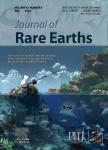Effect of Ce^(3+) on membrane permeability of Escherichia coli cell
Effect of Ce^(3+) on membrane permeability of Escherichia coli cell作者机构:Guangdong Institute of Microbiology Guangdong Open Laboratory of Applied Microbiology Guangdong Province Key Laboratory of Microbial Culture Collection and Application State Key Laboratory of Applied Microbiology(Ministry-Guangdong Province Jointly Breeding Base)South China
出 版 物:《Journal of Rare Earths》 (稀土学报(英文版))
年 卷 期:2012年第30卷第9期
页 面:947-951页
核心收录:
学科分类:081704[工学-应用化学] 07[理学] 08[工学] 0817[工学-化学工程与技术] 0703[理学-化学] 070301[理学-无机化学]
基 金:Project supported by National Natural Science Foundation of China (20971028) Guangdong Province Science and Technology Projects (2008A010500005, 2010B010800042) Guangdong Provincial Natural Science Foundation (10251007002000000) Young People's Foundation of Guangdong Academy of Sciences (qnjj201008)
主 题:cerium ion antibacterial activity outer membrane inner membrane membrane permeability rare earths
摘 要:This study aimed to delineate the antibacterial mechanism of rare-earth ion Ce3+ to the target organism Escherichia coil cell, and the most important purpose was to identify its biological effect of increasing the E. coli cell membrane permeability. The antibacterial activi- ties of Ce3+ to E. coli cells were tested, and then the permeability of outer membrane (OM) and inner membrane (IM) were studied by N-phenyl-l-naphthylamine (NPN) and o-nitrophenyl-β-D-galactopyranoside (ONPG) methods separately. Through these experiments we concluded that the E. coli cells grown to log phage were more sensitive to Ce3+ than the ones not at this stage; the structure of membrane was destroyed and the permeability of both OM and IM was obviously increased by Ce3+; there should be certain interactions between Ce3+ and some proteins inside the cell, which impeded the physiological activities of bacteria.



